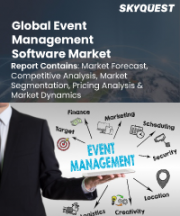
|
시장보고서
상품코드
1845756
장소 관리 소프트웨어 시장 규모 : 용도별, 배포 모델별, 최종사용자별, 지역 범위별, 예측Venue Management Software Market Size by Application, By Deployment Model, By End-user, By Geographic Scope and Forecast |
||||||
장소 관리 소프트웨어 시장 규모와 예측
장소 관리 소프트웨어 시장 규모는 2024년에 80억 달러로 평가되며, 2024-2031년에 12.50%의 CAGR로 성장하며, 2031년에는 205억 2,000만 달러에 달할 것으로 예측됩니다.
행사장 관리 소프트웨어는 행사를 주최하는 행사장의 운영을 간소화하고 강화하기 위해 고안된 전용 툴입니다. 이벤트 스케줄링, 예약, 물류 관리를 지원하여 다양한 활동 간의 원활한 조정을 실현하고 충돌을 방지합니다.
이 소프트웨어는 고객과의 상호 작용을 관리하고, 선호도를 추적하고, 고객 만족도를 높이는 개인화된 서비스를 제공하는 기능이 포함되어 있습니다.
또한 인보이스 발행, 보고서 작성, 리소스 할당 등 다양한 관리 업무를 자동화하여 전반적인 업무 효율성을 향상시키고 수작업으로 인한 실수를 줄입니다.
장소 관리 소프트웨어 시장 역학
행사장 관리 소프트웨어 시장을 형성하는 주요 시장 역학은 다음과 같습니다.
주요 시장 성장 촉진요인
이벤트 관리 자동화에 대한 수요 증가: 대규모 이벤트 관리의 복잡성과 수많은 이해관계자간의 원활한 조정의 필요성이 자동화된 행사장 관리 소프트웨어에 대한 수요를 촉진하고 있습니다. 자동화는 이벤트 주최자가 절차를 간소화하고 오류를 제거하며 전반적인 효율성을 높이는 데 도움이 됩니다. 업계 보고서에 따르면 행사장 관리 시스템을 포함한 이벤트 관리 소프트웨어 시장은 크게 확대될 것으로 예상되며, 거대 기업이 한 번에 많은 이벤트를 처리하기 위해 이러한 툴을 사용하는 경우가 점점 더 많아질 것으로 예측됩니다. 시장의 성장은 유연성과 확장성을 제공하는 클라우드 기반 서비스 이용에 힘입어 더욱 가속화되고 있습니다.
하이브리드 및 가상 이벤트 증가: COVID-19 팬데믹으로 인해 하이브리드 및 가상 이벤트 형태로의 전환이 가속화되고 있으며, 이에 따라 대면 및 가상 구성 요소를 모두 다루는 행사장 관리 소프트웨어에 대한 요구가 증가하고 있습니다. 물리적 컴포넌트와 온라인 컴포넌트가 혼합된 하이브리드 이벤트에서는 참가자 참여, 가상 네트워킹, 실시간 통계 등 다양한 요소를 관리하기 위한 복잡한 소프트웨어가 필요합니다. 최근 통계에 따르면 하이브리드 이벤트는 지난 5년간 237% 성장했으며, 이러한 추세는 앞으로도 지속될 것으로 예측됩니다.
데이터 중심의 의사결정: 기업이 이벤트 계획을 추진하기 위해 데이터 분석을 중시함에 따라 강력한 데이터 추적 및 보고 기능을 갖춘 행사장 관리 소프트웨어에 대한 수요가 증가하고 있습니다. 이 프로그램을 통해 행사 주최자는 참가자의 행동을 모니터링하고, ROI를 계산하고, 과거 이벤트를 기반으로 향후 이벤트를 최적화할 수 있습니다. 현재 통계에 따르면 전문 서비스 이벤트 주최자의 54% 이상이 주로 브랜드 인지도를 높이기 위해 이벤트를 이용하고 있으며, 상당수가 데이터 분석에 의존하여 이벤트 계획을 개선하고 있습니다.
주요 과제
높은 도입 비용: 고급 공연장 관리 소프트웨어 도입에 필요한 초기 투자비용은 중소기업에게 큰 장벽으로 인식되고 있습니다. 커스터마이징, 기존 시스템과의 통합, 직원 교육 관련 비용이 상당하여 중소기업의 도입이 제한적일 수 있습니다.
데이터 보안에 대한 우려: 공연장 관리 소프트웨어는 기밀성이 높은 고객 데이터와 재무 데이터를 다루기 때문에 데이터 유출 및 사이버 공격의 위험이 발생합니다. 강력한 보안 조치와 데이터 보호 규정 준수를 보장하는 것은 소프트웨어 프로바이더에게 큰 과제로 인식되고 있습니다.
통합 문제: 장소 관리 소프트웨어를 고객관계관리(CRM) 및 전사적자원관리(ERP) 시스템과 같은 다른 시스템과 통합하는 것은 복잡하고 시간이 많이 소요되는 과정으로 인식되고 있습니다. 호환성 문제가 종종 발생하여 지연 및 추가 비용 발생으로 이어지고 있습니다.
주요 동향
인공지능과 머신러닝의 통합: AI와 머신러닝이 행사장 관리 소프트웨어에 점점 더 많이 통합되고 있습니다. 이러한 기술은 대규모 데이터세트 분석, 고객 선호도에 대한 인사이트 제공, 이벤트 결과 예측, 자원 배분 최적화 등에 활용되고 있습니다.
모바일 애플리케이션 개발: 행사 관리자가 중요한 정보에 접근하고 원격으로 운영을 관리할 수 있도록 하기 위해 행사장 관리용 모바일 애플리케이션의 개발이 점점 더 많이 이루어지고 있습니다. 모바일 애플리케이션는 특히 빠르게 변화하는 이벤트 환경에서 유연성과 대응력을 높이고 있습니다.
지속가능성 중시: 이벤트 업계에서는 지속가능성을 중시하는 경향이 강해지고 있으며, 이를 지원하는 행사장 관리 소프트웨어가 진화하고 있습니다. 효율적인 에너지 관리, 폐기물 감소, 자원 최적화를 가능하게 하는 기능이 보급되고 있습니다.
장소 관리 소프트웨어 시장의 지역별 분석
다음은 장소 관리 소프트웨어 시장의 더 자세한 지역 분석입니다.
북미:
북미는 예측 기간 중 행사장 관리 소프트웨어 시장을 장악할 것으로 예측됩니다. 이 지역에는 주요 행사, 회의, 대규모 엔터테인먼트 시설이 밀집되어 있으며, 첨단 행사장 관리 소프트웨어의 채택이 두드러집니다. 이 지역 시장은 기술에 정통하며, 조직과 행사장 관리자들은 업무 효율성, 데이터 분석, 고객 참여 기능을 강화하는 새로운 기술을 빠르게 도입하고 있습니다. 북미 행사장에서는 실시간 분석, 모바일 액세스, 자동 스케줄링과 같은 고급 기능의 통합을 자주 볼 수 있습니다.
북미의 공연장 관리 소프트웨어는 스포츠 경기장, 컨벤션 센터, 극장, 콘서트홀 등 다양한 유형의 공연장에서 사용되고 있습니다. 이러한 다양성은 이 지역의 활기찬 이벤트 산업을 반영하며, 티켓 발권 및 예약에서 직원 관리 및 시설 정비에 이르기까지 다양한 운영 요구 사항을 충족하는 소프트웨어 솔루션이 필요합니다. 단일 소프트웨어 플랫폼에서 다양한 유형의 이벤트와 기능을 관리할 수 있다는 점에서 높은 평가를 받고 있습니다.
또한 북미의 공연장 관리 소프트웨어 시장은 주요 소프트웨어 프로바이더들 간의 치열한 경쟁이 특징입니다. 시장의 주요 업체들은 경쟁력을 유지하기 위해 지속적으로 소프트웨어를 혁신하고 강화하고 있습니다. 고급 보고 툴, 사용자 정의 가능한 대시보드, 다른 비즈니스 시스템과의 통합 등의 기능은 정기적으로 업데이트되고 있습니다. 이러한 경쟁 환경은 소프트웨어 솔루션의 잦은 기술 발전과 개선을 촉진하고 있습니다.
아시아태평양:
아시아태평양에서도 이벤트 산업이 호황을 누리며 행사장 관리 소프트웨어에 대한 수요를 견인하고 있습니다. Verified Market Research에 따르면 아시아태평양의 MICE(회의, 인센티브, 포상관광, 회의, 전시회) 산업은 2017년 2,297억 달러로 평가되었으며, 2025년에는 4,411억 달러에 달하고, CAGR 8.6%를 보일 것으로 예측됩니다. 이러한 성장으로 인해 점점 더 복잡해지는 이벤트에 대응할 수 있는 효율적인 행사장 관리 솔루션의 필요성이 대두되고 있습니다.
아시아태평양의 접객(Hoapitality) 부문은 첨단 행사장 관리 소프트웨어의 도입 등 디지털 전환이 빠르게 진행되고 있습니다. Zebra Technologies의 조사에 따르면 아시아태평양의 접객(Hoapitality) 업계 의사결정권자의 88%가 경쟁력을 유지하기 위해 조직이 새로운 기술에 투자해야 한다는 데 동의했습니다. 호텔과 이벤트 공간이 업무 간소화와 고객 경험 향상을 목표로 하는 가운데, 이러한 디지털화 추진은 행사장 관리 소프트웨어 시장을 촉진하고 있습니다.
또한 아시아태평양의 많은 정부가 MICE 관광을 적극적으로 추진하고 있으며, 간접적으로 행사장 관리 소프트웨어 시장을 촉진하고 있습니다. 예를 들어 싱가포르 관광청은 2019년 싱가포르의 비즈니스 이벤트가 약 38억 싱가포르 달러의 관광 수입을 창출했다고 보고했습니다. MICE 산업에 대한 정부의 지원은 대규모 행사를 유치하고 효율적으로 처리하기 위한 첨단 관리 소프트웨어에 대한 투자를 유도하고 있습니다.
유럽
유럽은 예측 기간 중 시장 내에서 큰 성장을 보일 것으로 예측됩니다. 유럽 공연장 관리 소프트웨어 시장은 다양한 국가의 규제, 표준, 시장 환경이 복잡하게 얽혀 있습니다. 따라서 소프트웨어 프로바이더는 다양한 법적 요건과 지역적 선호도를 준수하기 위해 솔루션을 커스터마이징해야 합니다. GDPR(EU 개인정보보호규정) 대응, 다국어 지원, 현지 결제 처리 방법 등 유럽 시장의 이질성을 반영한 기능 커스터마이징이 요구됩니다.
유럽 시장은 인프라 투자 증가와 이벤트 및 문화 활동의 활성화로 성장세를 보이고 있습니다. 유럽 각지의 주요 도시들은 관광산업의 호황과 국제회의, 축제, 전시회 개최에 대한 중요성이 높아짐에 따라 이벤트 개최 기능의 확대가 이루어지고 있습니다. 이러한 성장에 따라 복잡한 행사 일정과 다양한 참가자들의 요구를 효율적으로 관리할 수 있는 고급 소프트웨어 솔루션에 대한 수요가 증가하고 있습니다.
또한 유럽의 행사장 관리 소프트웨어는 지속가능성과 친환경 관행을 지원하는 기능을 점점 더 많이 내장하고 있습니다. 여기에는 에너지 소비 모니터링 및 절감, 폐기물 관리, 친환경 구상 추진 등의 툴이 포함됩니다. 지속가능성에 대한 강조는 규제 요건과 환경 문제에 대한 대중의 인식이 높아지면서 소프트웨어 개발자들은 행사장이 보다 친환경적인 방식으로 운영될 수 있도록 지원하는 기능을 통합하도록 영향을 받고 있습니다.
행사장 관리 소프트웨어 시장 부문 분석
장소 관리 소프트웨어 시장은 유형, 배포 모델, 최종사용자, 지역에 따라 세분화됩니다.
행사장 관리 소프트웨어 시장 : 유형별
이벤트 관리
시설관리
유형별로 시장은 이벤트 관리와 시설 관리로 구분됩니다. 이벤트 관리 분야는 효율적이고 간소화된 이벤트 계획 및 실행에 대한 수요 증가로 인해 행사장 관리 소프트웨어 시장을 주도할 것으로 예측됩니다. 행사장 관리 플랫폼에 통합된 이벤트 관리 소프트웨어는 예약, 스케줄링, 조정을 종합적으로 처리할 수 있으며, 수작업으로 인한 노동력과 오류를 줄일 수 있습니다. 기업 회의부터 대규모 회의에 이르기까지 다양한 이벤트를 개최하는 경향이 증가함에 따라 실시간 업데이트, 자동화된 워크플로우, 향상된 게스트 경험을 제공하는 강력한 이벤트 관리 툴에 대한 요구가 증가하고 있으며, 이 부문에서 시장 리더십을 확보하고 있습니다.
행사장 관리 소프트웨어 시장 : 전개 모델별
클라우드 기반
On-Premise
배포 유형에 따라 시장은 클라우드 기반과 On-Premise로 구분됩니다. 클라우드 기반 배포 부문은 유연성, 확장성, 비용 효율성으로 인해 행사장 관리 소프트웨어 시장을 장악할 것으로 예측됩니다. 클라우드 기반 시스템은 다른 플랫폼과의 원활한 통합을 제공하고, 어디서든 실시간으로 데이터에 액세스할 수 있으며, 원격 및 모바일 액세스가 필요한 조직에 매우 적합합니다. 또한 현장 IT 인프라의 필요성이 줄어들고 업데이트가 간소화된 점도 클라우드 기반 솔루션이 선호되는 요인으로 작용하여 시장에서의 우위를 확고히 하고 있습니다.
행사장 관리 소프트웨어 시장,최종사용자별
이벤트 장소
호텔·리조트
기업 사무실
기타
최종사용자별로 시장은 행사장, 기업 사무실, 호텔, 기타로 구분됩니다. 행사장 분야는 여러 행사를 동시에 처리해야 하는 특수한 요구가 있으므로 행사장 관리 소프트웨어 시장을 독점할 것으로 추정됩니다. 행사장에서는 예약, 플로어 플랜, 참가자 물류를 관리하고 원활한 운영을 보장하기 위해 첨단 툴이 필요합니다. 결혼식부터 콘서트까지 다양한 행사를 개최할 수 있는 장소에 대한 수요가 증가함에 따라 정교한 장소 관리 소프트웨어의 채택이 증가하고 있습니다. 이러한 플랫폼은 실시간 가용성, 자동 인보이스 발행, 상세한 보고서 등의 기능을 제공하여 행사장 운영자에게 필수적인 기능을 제공함으로써 행사장 부문의 우위를 강화하고 있습니다.
장소 관리 소프트웨어 시장,지역별
북미
유럽
아시아태평양
세계 기타 지역
지역별로는 북미, 유럽, 아시아태평양, 기타 지역 및 기타 지역으로 구분됩니다. 북미는 첨단 기술의 광범위한 채택과 주요 시장 기업의 존재로 인해 장소 관리 소프트웨어 시장을 지배할 것으로 추정됩니다. 이 지역은 이벤트 산업이 성숙하고 효율적인 행사장 관리 솔루션에 대한 수요가 높다는 점도 이 지역의 우위를 점하고 있습니다. 또한 특히 미국과 캐나다에서 대규모 이벤트, 컨퍼런스, 전시회를 개최하는 경향이 높아지면서 복잡한 물류를 관리하고 참가자들의 경험을 향상시키는 강력한 소프트웨어 솔루션에 대한 요구가 증가하고 있습니다. 이 때문에 북미가 시장을 선도하는 지역이 되었습니다.
주요 기업
- "장소 관리 소프트웨어 시장" 조사 보고서는 세계 시장에 초점을 맞춘 귀중한 인사이트를 제공합니다. 주요 업체로는 Eventbrite, Cvent, Ungerboeck Software, EventPro, Skedda, VenueOps, Priava, Event Temple, Tripleseat, Social Tables 등이 있습니다.
당사 시장 분석에는 이러한 주요 업체만을 다루는 섹션이 있으며, 애널리스트가 제품 벤치마킹 및 SWOT 분석과 함께 모든 주요 업체의 재무 제표에 대한 인사이트를 제공합니다. 경쟁 구도 섹션에는 위의 기업의 세계 주요 개발 전략, 시장 점유율 및 시장 순위 분석도 포함되어 있습니다.
- 행사장 관리 소프트웨어 시장의 최근 동향
- 2024년 8월, EventPro는 고급 예측 알고리즘과 실시간 데이터 분석을 통해 이벤트 계획과 참가자 참여를 최적화하도록 설계된 새로운 AI 기반 분석 플랫폼 'EventInsights'를 발표했습니다. 이번 개발은 행사장 관리의 사용자 경험과 업무 효율성 향상을 목표로 하고 있습니다.
- 2024년 6월, VenueTech Solutions는 CRM과 티켓 판매 시스템을 통합한 VenueLink를 발표했습니다. VenueLink는 고객 관계 관리와 실시간 티켓 판매 및 마케팅 자동화를 결합하여 이벤트 관리를 간소화하고 전체 이벤트의 조정을 개선합니다.
- 2024년 4월, 클라우드 기반 공연장 관리 소프트웨어에 모바일 기능을 추가하여 실시간 업데이트, 원격 관리, 이동 중에도 공연장 운영에 대한 액세스를 가능하게 하여 공연장 관리자의 유연성을 높였습니다.
목차
제1장 세계의 장소 관리 소프트웨어 시장의 서론
- 시장 개요
- 조사 범위
- 전제조건
제2장 개요
제3장 VERIFIED MARKET RESEARCH의 조사 방법
- 데이터 마이닝
- 밸리데이션
- 1차 자료
- 데이터 소스 리스트
제4장 세계의 장소 관리 소프트웨어 시장 전망
- 개요
- 시장 역학
- 촉진요인
- 저해요인
- 기회
- Porter's Five Forces 모델
- 밸류체인 분석
제5장 세계의 장소 관리 소프트웨어 시장 : 배포 유형별
- 개요
- 온프레미스
- 클라우드
제6장 세계의 장소 관리 소프트웨어 시장 : 최종사용자별
- 개요
- 기업
- 정부기관
- 서드파티플래너
- 교육 기관
- 기타(비영리 이벤트·매니지먼트 업계 및 단체)
제7장 세계의 장소 관리 소프트웨어 시장, 지역별
- 개요
- 북미
- 미국
- 캐나다
- 멕시코
- 유럽
- 독일
- 영국
- 프랑스
- 기타 유럽
- 아시아태평양
- 중국
- 일본
- 인도
- 기타 아시아태평양
- 세계의 기타 지역
- 라틴아메리카
- 중동 및 아프리카
제8장 세계의 장소 관리 소프트웨어 시장의 경쟁 구도
- 개요
- 각사의 시장 순위
- 주요 발전 전략
제9장 기업 개요
- Active Network, LLC
- Arlo
- Aventri, Inc
- EVENTGREEK
- EventMobi
- REGPACKS
- Events Espresso
- CERTAIN INC.
- Bizzabo
- Grenadine Technologies Inc.
제10장 부록
- 관련 조사
Venue Management Software Market Size And Forecast
Venue Management Software Market size was valued at USD 8 Billion in 2024 and is projected to reach USD 20.52 Billion by 2031, growing at a CAGR of 12.50% from 2024 to 2031.
Venue management software is a specialized tool designed to streamline and enhance the operations of venues that host events. It helps in managing the scheduling, booking, and logistics of events, ensuring smooth coordination between different activities and preventing conflicts.
The software includes features for managing client interactions, tracking preferences, and providing personalized services, which enhances customer satisfaction.
Furthermore, it automates various administrative tasks, such as invoicing, reporting, and resource allocation, improving overall operational efficiency and reducing manual errors.
Venue Management Software Market Dynamics
The key market dynamics that are shaping the venue management software market include:
Key Market Drivers:
Increased Demand for Automation in Event Management: The increased complexity of managing large-scale events, combined with the necessity for seamless coordination among numerous stakeholders, is driving demand for automated venue management software. Automation helps event organizers streamline procedures, eliminate errors, and increase overall efficiency. According to industry reports, the event management software market, which includes venue management systems, is predicted to expand dramatically, with huge corporations increasingly using these tools to handle many events at once. The market's growth is further helped by the usage of cloud-based services, which provide flexibility and scalability.
Rise in Hybrid and Virtual Events: The COVID-19 epidemic has accelerated the transition toward hybrid and virtual event forms, resulting in the increased need for venue management software that handles both in-person and virtual components. Hybrid events, which blend physical and online components, necessitate complex software to manage a variety of factors such as participant engagement, virtual networking, and real-time statistics. According to recent statistics, hybrid events have expanded by 237% in the last five years, and this trend is projected to continue, with 97% of event marketers believing in the growing importance of hybrid formats.
Growing Emphasis on Data-Driven Decision-Making: As organizations place a larger emphasis on data analytics to drive their event plans, the demand for venue management software with powerful data tracking and reporting capabilities grows. This program enables event organizers to monitor attendee behavior, calculate ROI, and optimize future events based on past ones. According to current statistics, over 54% of event organizers in professional services use events primarily to build brand awareness, and a substantial majority rely on data analytics to improve their event plans.
Key Challenges:
High Implementation Costs: The initial investment required for the implementation of advanced venue management software is recognized as a significant barrier for small and medium-sized businesses. Costs associated with customization, integration with existing systems, and staff training are substantial, potentially limiting adoption among smaller enterprises.
Data Security Concerns: Venue management software is responsible for handling sensitive customer and financial data, which introduces risks of data breaches and cyber-attacks. Ensuring robust security measures and compliance with data protection regulations is recognized as a major challenge for software providers.
Integration Issues: Integrating venue management software with other systems, including customer relationship management (CRM) and enterprise resource planning (ERP) systems, is acknowledged as a complex and time-consuming process. Compatibility issues often arise, leading to delays and incurring additional costs.
Key Trends:
Artificial Intelligence and Machine Learning Integration: The integration of AI and machine learning into venue management software is increasingly observed. These technologies are utilized to analyze large datasets, provide insights into customer preferences, predict event outcomes, and optimize resource allocation.
Mobile Application Development: The development of mobile applications for venue management is increasingly pursued, allowing event managers to access critical information and manage operations remotely. Mobile apps are enhancing flexibility and responsiveness, particularly in fast-paced event environments.
Sustainability Focus: A growing emphasis on sustainability within the events industry is driving the evolution of venue management software to support this trend. Features that enable efficient energy management, waste reduction, and resource optimization are becoming more prevalent.
Venue Management Software Market Regional Analysis
Here is a more detailed regional analysis of the venue management software market:
North America:
North America is estimated to dominate the venue management software market during the forecast period. The adoption of advanced venue management software is prominent due to the region's dense concentration of major events, conferences, and large-scale entertainment venues. This is driven by the region's tech-savvy market, where organizations and venue managers are quick to embrace new technologies that offer enhanced operational efficiency, data analysis, and customer engagement capabilities. The integration of advanced features such as real-time analytics, mobile access, and automated scheduling is frequently observed in North American venues.
Venue management software in North America is employed across a broad spectrum of venue types, including sports stadiums, convention centers, theaters, and concert halls. This diversity is reflective of the region's vibrant event industry, which requires software solutions that handle various operational needs, from ticketing and reservations to staff management and facility maintenance. The ability to manage different types of events and functions within a single software platform is highly valued.
Furthermore, North American venue management software market is characterized by intense competition among leading software providers. Major players in the market continually innovate and enhance their software offerings to maintain a competitive edge. Features such as advanced reporting tools, customizable dashboards, and integration with other business systems are regularly updated. This competitive environment drives frequent technological advancements and improvements in software solutions.
Asia Pacific:
The Asia Pacific region is also experiencing a boom in the events industry, driving the demand for venue management software. According to Verified Market Research, the Asia-Pacific MICE (Meetings, Incentives, Conferences, and Exhibitions) industry was valued at $229.7 billion in 2017 and is projected to reach $441.1 billion by 2025, growing at a CAGR of 8.6%. This substantial growth is fueling the need for efficient venue management solutions to handle the increasing number and complexity of events.
The hospitality sector in Asia Pacific is undergoing rapid digital transformation, which includes the adoption of advanced venue management software. A study by Zebra Technologies revealed that 88% of hospitality decision-makers in Asia Pacific agreed that their organization needs to invest in new technologies to remain competitive. This drive towards digitalization is boosting the venue management software market as hotels and event spaces seek to streamline their operations and enhance guest experiences.
Furthermore, many governments in the Asia Pacific region are actively promoting MICE tourism, indirectly driving the venue management software market. For instance, the Singapore Tourism Board reported that business events in Singapore generated approximately S$3.8 billion in tourism receipts in 2019. Government support for the MICE industry is encouraging venues to invest in advanced management software to attract and efficiently handle large-scale events.
Europe:
Europe region is estimated to exhibit significant growth within the market during the forecast period. The European venue management software market is influenced by a complex landscape of regulations, standards, and market conditions across different countries. As a result, software providers often need to tailor their solutions to comply with diverse legal requirements and regional preferences. Customization is required for features such as GDPR compliance, multi-language support, and local payment processing methods, reflecting the heterogeneous nature of the European market.
It is experiencing growth due to increased investments in infrastructure and a rise in events and cultural activities. Major cities across Europe are expanding their event-hosting capabilities, driven by a booming tourism industry and a growing emphasis on hosting international conferences, festivals, and exhibitions. This growth is accompanied by rising demand for sophisticated software solutions that efficiently manage complex event schedules and diverse attendee needs.
Furthermore, European venue management software increasingly incorporates features that support sustainability and eco-friendly practices. This includes tools for monitoring and reducing energy consumption, managing waste, and promoting green initiatives. The emphasis on sustainability is driven by both regulatory requirements and growing public awareness of environmental issues, influencing software developers to integrate features that help venues operate in a more environmentally responsible manner.
Venue Management Software Market: Segmentation Analysis
The Venue Management Software Market is segmented based on Type, Deployment Model, End-user, and Geography.
Venue Management Software Market, By Type
Event Management
Facility Management
Based on Type, the market is segmented into Event Management and Facility Management. The event management segment is estimated to dominate the venue management software market due to the increasing demand for efficient and streamlined event planning and execution. Event management software integrated within venue management platforms allows for comprehensive handling of bookings, scheduling, and coordination, reducing manual effort and errors. The rising trend of hosting diverse events, from corporate meetings to large-scale conferences, drives the need for robust event management tools that offer real-time updates, automated workflows, and enhanced guest experiences, ensuring the segment's market leadership.
Venue Management Software Market, By Deployment Model
Cloud-Based
On-Premises
Based on Deployment Type, the market is segmented into Cloud-Based and On-Premises. The cloud-based deployment segment is estimated to dominate the venue management software market due to its flexibility, scalability, and cost-effectiveness. Cloud-based systems offer seamless integration with other platforms and enable real-time access to data from any location, making them highly suitable for organizations that require remote or mobile access. Additionally, the reduced need for on-site IT infrastructure and simplified updates contribute to the growing preference for cloud-based solutions, solidifying their market dominance.
Venue Management Software Market, By End-user
Event Venues
Hotels and Resorts
Corporate Offices
Others
Based on End-user, the market is segmented into Event Venues, Corporate Offices, Hotels, and Others. The event venues segment is estimated to dominate the venue management software market due to the specialized needs of these spaces in handling multiple events simultaneously. Event venues require advanced tools to manage bookings, floor plans, and attendee logistics, ensuring seamless operations. The growing demand for venues capable of hosting a variety of events, from weddings to concerts, drives the adoption of sophisticated venue management software. These platforms offer features like real-time availability, automated invoicing, and detailed reporting, making them essential for venue operators, thus reinforcing the dominance of the event venues segment.
Venue Management Software Market, By Geography
North America
Europe
Asia Pacific
Rest of the World
Based on Geography, the market is segmented into North America, Europe, Asia Pacific, and the Rest of the World. The North American region is estimated to dominate the venue management software market due to the widespread adoption of advanced technologies and the presence of key market players. The region's mature event industry, with a high demand for efficient venue management solutions, further contributes to its leadership. Additionally, the growing trend of hosting large-scale events, conferences, and exhibitions, particularly in the United States and Canada, drives the need for robust software solutions that manage complex logistics and enhance attendee experiences. This establishes North America as the leading region in the market.
Key Players
- The "Venue Management Software Market" study report will provide valuable insight with an emphasis on the global market. The major players in the market are Eventbrite, Cvent, Ungerboeck Software, EventPro, Skedda, VenueOps, Priava, Event Temple, Tripleseat, and Social Tables.
Our market analysis also entails a section solely dedicated to such major players wherein our analysts provide an insight into the financial statements of all the major players, along with product benchmarking and SWOT analysis. The competitive landscape section also includes key development strategies, market share, and market ranking analysis of the above-mentioned players globally.
- Venue Management Software Market Recent Developments
- In August 2024, EventPro launched its new AI-driven analytics platform, EventInsights, designed to optimize event planning and attendee engagement through advanced predictive algorithms and real-time data analysis. This development aims to enhance user experience and operational efficiency in venue management.
- In June 2024, VenueTech Solutions introduced an integrated CRM and ticketing system, VenueLink, which streamlines event management by combining customer relationship management with real-time ticket sales and marketing automation, thereby improving overall event coordination.
- In April 2024, CloudVenue expanded its cloud-based venue management software with new mobile capabilities, allowing for real-time updates, remote management, and on-the-go access to venue operations, thereby increasing flexibility for venue managers.
TABLE OF CONTENTS
1 INTRODUCTION OF GLOBAL VENUE MANAGEMENT SOFTWARE MARKET
- 1.1 Overview of the Market
- 1.2 Scope of Report
- 1.3 Assumptions
2 EXECUTIVE SUMMARY
3 RESEARCH METHODOLOGY OF VERIFIED MARKET RESEARCH
- 3.1 Data Mining
- 3.2 Validation
- 3.3 Primary Interviews
- 3.4 List of Data Sources
4 GLOBAL VENUE MANAGEMENT SOFTWARE MARKET OUTLOOK
- 4.1 Overview
- 4.2 Market Dynamics
- 4.2.1 Drivers
- 4.2.2 Restraints
- 4.2.3 Opportunities
- 4.3 Porters Five Force Model
- 4.4 Value Chain Analysis
5 GLOBAL VENUE MANAGEMENT SOFTWARE MARKET, BY DEPLOYMENT TYPE
- 5.1 Overview
- 5.2 On-premises
- 5.3 Cloud
6 GLOBAL VENUE MANAGEMENT SOFTWARE MARKET, BY END-USER
- 6.1 Overview
- 6.2 Corporate
- 6.3 Government
- 6.4 Third-party planner
- 6.5 Education
- 6.6 Others (Non-profit event management industry and associations)
7 GLOBAL VENUE MANAGEMENT SOFTWARE MARKET, BY GEOGRAPHY
- 7.1 Overview
- 7.2 North America
- 7.2.1 U.S.
- 7.2.2 Canada
- 7.2.3 Mexico
- 7.3 Europe
- 7.3.1 Germany
- 7.3.2 U.K.
- 7.3.3 France
- 7.3.4 Rest of Europe
- 7.4 Asia Pacific
- 7.4.1 China
- 7.4.2 Japan
- 7.4.3 India
- 7.4.4 Rest of Asia Pacific
- 7.5 Rest of the World
- 7.5.1 Latin America
- 7.5.2 Middle East and Africa
8 GLOBAL VENUE MANAGEMENT SOFTWARE MARKET COMPETITIVE LANDSCAPE
- 8.1 Overview
- 8.2 Company Market Ranking
- 8.3 Key Development Strategies
9 COMPANY PROFILES
- 9.1 Active Network, LLC
- 9.1.1 Overview
- 9.1.2 Financial Performance
- 9.1.3 Product Outlook
- 9.1.4 Key Developments
- 9.2 Arlo
- 9.2.1 Overview
- 9.2.2 Financial Performance
- 9.2.3 Product Outlook
- 9.2.4 Key Developments
- 9.3 Aventri, Inc
- 9.3.1 Overview
- 9.3.2 Financial Performance
- 9.3.3 Product Outlook
- 9.3.4 Key Developments
- 9.4 EVENTGREEK
- 9.4.1 Overview
- 9.4.2 Financial Performance
- 9.4.3 Product Outlook
- 9.4.4 Key Developments
- 9.5 EventMobi
- 9.5.1 Overview
- 9.5.2 Financial Performance
- 9.5.3 Product Outlook
- 9.5.4 Key Developments
- 9.6 REGPACKS
- 9.6.1 Overview
- 9.6.2 Financial Performance
- 9.6.3 Product Outlook
- 9.6.4 Key Developments
- 9.7 Events Espresso
- 9.7.1 Overview
- 9.7.2 Financial Performance
- 9.7.3 Product Outlook
- 9.7.4 Key Developments
- 9.8 CERTAIN INC.
- 9.8.1 Overview
- 9.8.2 Financial Performance
- 9.8.3 Product Outlook
- 9.8.4 Key Developments
- 9.9 Bizzabo
- 9.9.1 Overview
- 9.9.2 Financial Performance
- 9.9.3 Product Outlook
- 9.9.4 Key Developments
- 9.10 Grenadine Technologies Inc.
- 9.10.1 Overview
- 9.10.2 Financial Performance
- 9.10.3 Product Outlook
- 9.10.4 Key Developments
10 Appendix
- 10.1 Related Research



















